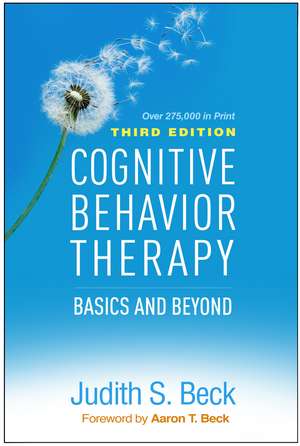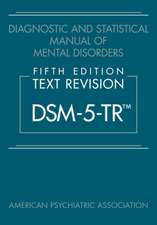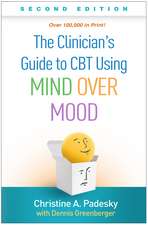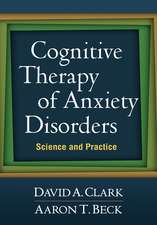Cognitive Behavior Therapy, Third Edition: Basics and Beyond
Autor Judith S. Becken Limba Engleză Hardback – 6 noi 2020
Hundreds of thousands of clinicians and graduate students have relied on this text--now significantly revised with more than 50% new material--to learn the fundamentals of cognitive behavior therapy (CBT).
Preț: 419.84 lei
Preț vechi: 441.93 lei
-5% Nou
80.35€ • 83.57$ • 66.33£
Carte disponibilă
Livrare economică 24 martie-07 aprilie
Livrare express 07-13 martie pentru 39.80 lei
Specificații
ISBN-10: 1462544193
Pagini: 414
Dimensiuni: 152 x 229 x 35 mm
Greutate: 0.68 kg
Ediția:3 ed
Editura: Guilford Publications
Colecția Guilford Press
Public țintă
Postgraduate, Professional, and UndergraduateCuprins
Foreword, Aaron T. Beck
1. Introduction to Cognitive Behavior Therapy
2. Overview of Treatment
3. Cognitive Conceptualization
4. The Therapeutic Relationship
5. The Evaluation Session
6. The First Therapy Session
7. Activity Scheduling
8. Action Plans
9. Treatment Planning
10. Structuring Sessions
11. Problems in Structuring Sessions
12. Identifying Automatic Thoughts
13. Emotions
14. Evaluating Automatic Thoughts
15. Responding to Automatic Thoughts
16. Integrating Mindfulness into CBT
17. Introduction to Beliefs
18. Modifying Beliefs
19. Additional Techniques
20. Imagery
21. Termination and Relapse Prevention
22. Problems in Therapy
Appendix A. CBT Resources
Appendix B. Beck Institute Case Write-Up: Summary and Conceptualization
Appendix C. Steps in the AWARE Technique
Appendix D. Restructuring the Meaning of Early Memories through Experiential Techniques
Notă biografică
Judith S. Beck, PhD, is President of the Beck Institute for Cognitive Behavior Therapy (www.beckinstitute.org), a nonprofit organization that provides state-of-the-art training and certification in CBT to individuals and organizations, offers online courses on a variety of CBT topics, conducts research, and serves as a leading global resource in CBT. She is also Clinical Professor of Psychology in Psychiatry at the University of Pennsylvania Perelman School of Medicine. Dr. Beck has written over 100 articles and chapters as well as books, workbooks, and pamphlets for professionals and nonprofessionals, including Cognitive Behavior Therapy, Third Edition: Basics and Beyond and Cognitive Therapy for Challenging Problems: What to Do When the Basics Don¿t Work. She has made hundreds of presentations nationally and internationally on various applications of CBT and is the primary developer of the Beck Institute¿s online CBT training courses, which have been taken by health and mental health professionals in over 130 countries. Dr. Beck maintains a clinical caseload at the Beck Institute¿s in-house clinic in suburban Philadelphia, helping clients who are experiencing a range of challenges.
Recenzii
"This thoroughly revised third edition provides a systematic bird's-eye view of the method and thinking of an experienced, gifted CBT practitioner. Beck's conversational tone is welcoming and reassuring. The text includes transcripts, reflection questions, practice exercises, and clinical tips for the learner. It seamlessly incorporates contemporary elements of CBT, including mindfulness and the consideration of patient strengths, aspirations, and values. Beginning practitioners will find the rubrics for considering stuck points in therapy and performing good evaluations to be invaluable. This book is a 'must' for anyone interested in learning more about both the micro-skills of CBT and the big picture of thoughtful and reflective therapeutic practice."--Donna M. Sudak, MD, Department of Psychiatry, Drexel University
"CBT is exploding in all directions. Before exploring far-off territories, I recommend learners start here! 'Basic' is defined as 'forming an essential foundation or starting point; fundamental,' which describes this book perfectly. It is an ideal text for graduate students learning CBT and for practitioners at all levels of experience who are new to CBT and want to learn the foundational principles and practices of this important psychotherapy model."--Jacqueline B. Persons, PhD, Director, Oakland Cognitive Behavior Therapy Center; Clinical Professor, Department of Psychology, University of California, Berkeley
"My students regularly comment that Beck’s book is their favorite of all the texts in our course. She creates a relationship with readers that increases their ability to understand and apply information from the text, just like a therapeutic alliance facilitates the patient’s incorporation of new data in therapy. Any student of psychology can pick up the third edition and get a full understanding of the nature, scope, structure, and strengths of CBT."--Laird Bridgman, PsyD, The Chicago School of Professional Psychology, Irvine, California; private practice, Lake Forest, California
"I am delighted to see the third edition of this classic work, which includes a positive, strengths-based perspective for clinicians working with people who struggle with significant mental health problems. Focusing on individual values, goals, strengths, and resources, and on newer evidence-based cognitive and behavioral strategies, will surely benefit patients and their families. This essential resource with clear examples will enhance the practice skills of psychologists, social workers, psychiatric nurses, psychiatrists, licensed mental health practitioners, and their students."--Gail Steketee, PhD, Professor and Dean Emerita, Boston University School of Social Work
“The third edition of Judith Beck’s classic text builds on the legacy of prior editions by including positive, recovery-based methods; mindfulness; and other newer developments that make it even more valuable to students and clinicians. Beck’s inspiring therapy with her clients shines through and gives readers a feast of practical examples of how to put CBT into action. A leading force in the practice and evolution of CBT, Beck has given us a book to treasure.”--Jesse H. Wright, MD, PhD, Kolb Endowed Chair of Outpatient Psychiatry and Director, Depression Center, University of Louisville School of Medicine-This book is excellent because it is a step-by-step approach to understanding cognitive behavior therapy, written by an expert in the field. The clinical examples really help the readers understand how theory is applied. The book should be in the libraries of students first learning the CBT process. However, seasoned professionals will also gain much from this volume as well. The third edition is needed because the book has been updated with new material and a companion website.*****!--Doody’s Review Service, 4/23/2021ƒƒA comprehensive and highly useful teaching text that can be used by either therapists-in-training or experienced therapists….Judith Beck is a master psychotherapist who has successfully compiled a text that clearly explains the fundamentals of cognitive therapy in a way that will be exceedingly useful to anyone studying psychotherapy. Psychiatry residents I work with consistently want to see actual examples of how psychotherapy is done. This book, with its extensive dialogues, provides a clear example of how a skilled, empathic therapist conducts treatment. What is most impressive about this work is that it provides thorough and detailed instruction yet is concise enough to be read cover-to-cover in a reasonable length of time….After mastering this text, those interested in more in-depth instruction from Dr. Beck can obtain her work Cognitive Therapy for Challenging Problems: What to Do When the Basics Don't Work, also published by Guilford Press. (on the second edition)--Journal of Psychiatric Practice, 7/1/2013ƒƒA comprehensive road map to the practice of CBT [and] a must-read guide for graduate students and practicing therapists who are interested in learning the essentials of CBT. It will no doubt be recognized as a classic text in the field due not only to its excellent coverage of CBT, but also to the clear, concise, and illustrative manner in which the techniques are presented. (on the second edition)--Journal of Clinical Psychiatry, 9/3/2012
Descriere
Hundreds of thousands of clinicians and graduate students have relied on this text--now significantly revised with more than 50% new material--to learn the fundamentals of cognitive behavior therapy (CBT). Leading expert Judith S. Beck demonstrates how to engage patients, develop a sound case conceptualization, plan individualized treatment, structure sessions, and implement core cognitive, behavioral, and experiential techniques. Throughout the book, extended cases of one client with severe depression and another with depression, anxiety, and borderline personality disorder traits illustrate how a skilled therapist delivers CBT and troubleshoots common difficulties. Adding to the third edition's utility, the companion website features downloadable worksheets and videos of therapy sessions.
New to This Edition
*Chapter on the therapeutic relationship.
*Chapter on integrating mindfulness into treatment.
*Presents recovery-oriented cognitive therapy (CT-R)--which emphasizes clients' aspirations, values, and positive adaptation--alongside traditional CBT.
*Pedagogical features: clinical tips, reflection questions, practice exercises, and videos at the companion website.
*New case examples featuring clients with more complex problems.
*Demonstrates how to integrate strategies from other modalities, such as acceptance and commitment therapy, dialectical behavior therapy, and mindfulness-based cognitive therapy.














